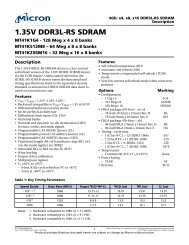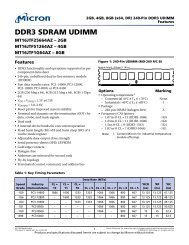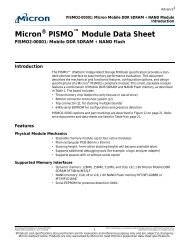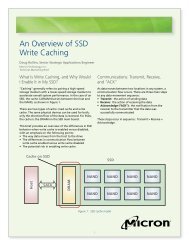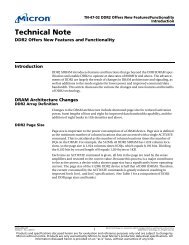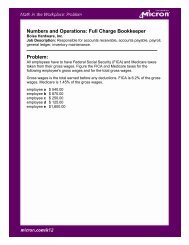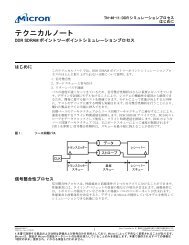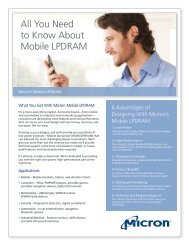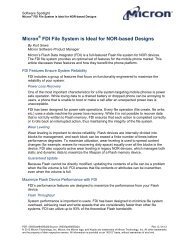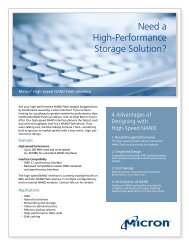Code of Business Conduct and Ethics - Micron
Code of Business Conduct and Ethics - Micron
Code of Business Conduct and Ethics - Micron
Create successful ePaper yourself
Turn your PDF publications into a flip-book with our unique Google optimized e-Paper software.
12<br />
Q<br />
I have just been hired<br />
from another company.<br />
I have a box <strong>of</strong> materials<br />
from my former employer<br />
that would be very helpful<br />
in developing marketing<br />
plans for <strong>Micron</strong>. May I bring<br />
this with me?<br />
A<br />
No. You should not bring<br />
materials to <strong>Micron</strong> from a<br />
prior job at another company<br />
that may contain confidential<br />
information. Just as<br />
it would be wrong for<br />
someone<br />
to take our confidential<br />
information out <strong>of</strong> <strong>Micron</strong>,<br />
we should not<br />
use the confidential<br />
information<br />
<strong>of</strong> others.<br />
• Serving as a director or <strong>of</strong>ficer in a company that competes with <strong>Micron</strong>; or<br />
• Setting resale prices with resellers.<br />
Monopolizing, trying to monopolize markets or abusing a dominant position<br />
are illegal:<br />
U.S. antitrust laws make it illegal to monopolize or attempt to monopolize a<br />
market, <strong>and</strong> other countries’ laws regulate the conduct <strong>of</strong> companies that obtain<br />
a “dominant position.” A dominant company should not try to prevent others<br />
from entering the market, or to eliminate competition, for example, through<br />
predatory practices. Usually, competitors set prices to cover their costs – below-cost<br />
pricing may appear to be “predatory.” If there is a reason to price below cost, this<br />
should be reviewed with the Legal Department to assure that it is not predatory or<br />
in violation <strong>of</strong> any relevant law.<br />
Charging different prices to customers who are competitors may be illegal:<br />
In the U.S., a complex law called the “Robinson-Patman Act” in some cases<br />
prohibits charging different prices on sales <strong>of</strong> goods to customers who compete<br />
with one another. There are a number <strong>of</strong> exceptions <strong>and</strong> defenses to this law.<br />
Team members with authority to set prices in the U.S. need to learn the<br />
requirements <strong>of</strong> this law <strong>and</strong> consult the Legal Department on pricing practices.<br />
Information About Competitors:<br />
To compete in the marketplace, it is necessary <strong>and</strong> legal to gather<br />
competitive information fairly. But some forms <strong>of</strong> information gathering are<br />
wrong <strong>and</strong> can even violate the law. In the U.S., one such law that covers this is<br />
the Economic Espionage Act. At <strong>Micron</strong>, we are committed to avoiding improper<br />
information gathering, so know what you can do <strong>and</strong> what you must be<br />
careful about.<br />
Legitimate sources <strong>of</strong> competitive information include:<br />
• Newspapers <strong>and</strong> press accounts;<br />
• Public filings;<br />
• Talking with customers – but not to obtain confidential information;<br />
• Information that is observable on the street;<br />
• Customers giving you a competitor’s proposal, but only if it is not confidential.<br />
If it is a government bid, always consult the Legal Department first;<br />
• Trade shows (but not confidential information from competitors – see Competition<br />
<strong>and</strong> Antitrust Laws in this <strong>Code</strong>);<br />
• Information publicly available on the Internet; <strong>and</strong><br />
• Industry surveys by reputable consultants.<br />
Never use the following without approval <strong>of</strong> the Legal Department:<br />
• A competitor’s confidential information;<br />
• Papers or computer records brought by new hires from prior employers;



